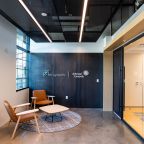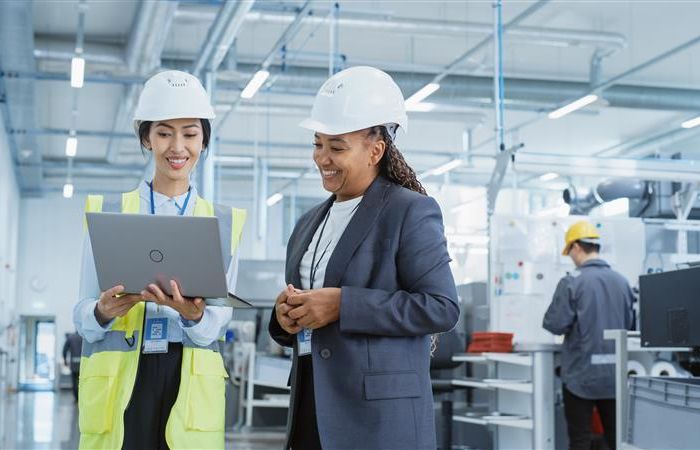In our recent webinar, Deloitte Consulting’s Jessica Coxson, and her colleague, Patrick McCoy, joined FM:Systems’ Chief Strategy Officer, Brian Haines, to offer responses to three questions that illuminate how an ever-ready company can build support for managing change in the workplace. Michael Gresty, VP of Strategy at FM:Systems moderated.

Workplace Challenges and How Organizations Are Overcoming Them
Jessica began by observing that through their experiences during the pandemic, most organizations have met the challenges of managing change in the workplace by supporting a remote workforce and maintaining operations. Now they are wondering how much space they will need and how they will really utilize that space in a post-pandemic “new normal.” They need to solve these problems in the immediate and for the longer term, without knowing what that longer term will be because employees won’t operate in the same way as they did. Remote work, for example, is here to stay in some form or other. We all need to prepare for the long-term changes, and in every case, technology and leveraging data to make decisions is part of the answer.

Brian raised two more challenges. First, employee sentiment, and specifically employees’ anxiety about safety in the workplace and being in close proximity to people after more than a year of isolation. Organizations need to address this directly. Second is adaptation of the role of the workplace now that we have all learned that most employees can work from home successfully. Many organizations are going to adopt a much more flexible approach and offer employees the ability to select where to work almost every single day. The results from a poll of attendees re-confirmed expectations among workplace professionals that most employees will want to go to an office only 2-3 days a week.
Policies, Procedures and Technologies for the New Normal
With so much having changed during the pandemic, most organizations need to rethink, formalize and above all, communicate to employees updated and new policies and procedures as offices re-open. These affect everything, from what was called “telework,” to performance management, to health, safety, and sanitization. As Patrick noted, they need to think through, for example, who needs to collaborate with whom in the office, determine whether these are fixed days or not, and how that will affect demand for space so they can formalize their solution. Patrick also highlighted that organizations will be fixing the patchwork approach to technology that they implemented going into the pandemic and be more thoughtful about the technology ecosystem and how people use technologies to collaborate and communicate most effectively.

In addition, workplace technologies for better managing the workplace, getting insights into the reservation of space and management and insights, are all being overhauled. Brian highlighted that effective policies that are well communicated will go a long way to reassuring employees that their offices have been made safe and that their colleagues will follow protocols that protect everyone’s health. With more and more organizations deploying technology in the workplace, from booking systems to sensors, organizations need to let employees know how data is being collected and used to improve both workplace efficiency and the employee experience. Policies encompassing data privacy should, as Brian observed, be a high priority.

How to Transition to an Ever-Ready Workplace
The panelists highlighted that the workplace for the new normal needs to be “ever-ready.” This means that the offering available to employees must be much more adaptable to changing organizational and business needs than workplaces have ever been before. Brian emphasized the importance of resilience and flexibility. Challenged to explain how organizations could achieve this, Jessica’s response was, be bold! She emphasized two critical steps: first, assess the portfolio and your space needs and quickly exit excess space; second, really design for flexibility and mobility and create spaces that your employees want to come back to. “I say be deliberate and bold,” said Jessica, “create a workplace that is energizing and reflects your values as a brand, as an agency or organization.” Another attendee poll confirmed that most expect space needs to remain the same (42%) or decrease (53%), with 28% of the respondents saying it would decrease by 20% or more.

Going further, Brian noted that “we’ve never been given the opportunity to come back to a clean slate, literally globally,” and should design based on insights from data and the application of technology. He agreed that organizations will need to incentivize employees to come back by offering venues that truly enable the traditional collaboration, camaraderie, and team building that were difficult to support during 100% work-from-home. Tempering the expectation that most organizations can, and should, shed space, Patrick observed that in some cases, new collaborative space simply replaces space freed up by reducing the number of workstations. As revealed in an audience poll, many professionals are thinking about more resilient, adaptable portfolios rather than just spaces. They see some form of coworking solution as key, with 38% expecting coworking to grow in the next year
In conclusion, pre-pandemic offices will not meet post-pandemic need but data driven design and operations, coupled with thoughtful, proactive integration of technology will invisibly drive success. In the new normal, safety and security to overcome anxiety will be the first priority, closely followed by deployment of collaborative spaces that attract and inspire employees. The best organizations will be bold and develop a resilient, adaptable portfolio-approach that also includes coworking as an essential element of their strategy.
Listen to the full panel discussion on-demand.











